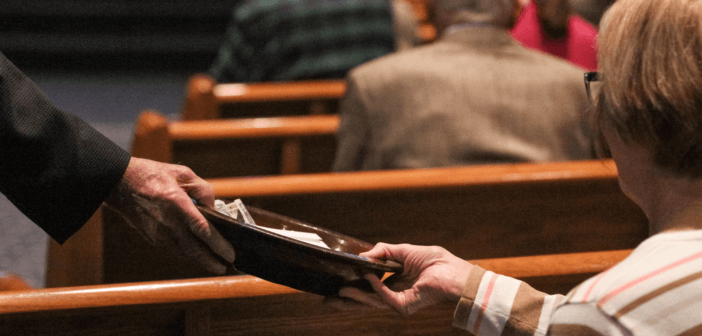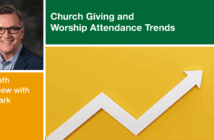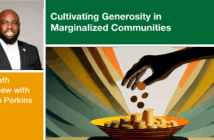What do church financial leaders need to know when discussing generosity with retirees? Stewardship expert Ken Sloane shares five considerations that might shape a recent retiree’s mindset when it comes to sharing their treasure and their time.
I’m getting older. Some would say I’m already old. While I’m not retiring yet, I recognize that it’s true that what retirement looks like when you are starting your work life is often different from when retirement is closer on the horizon. You start to think, “When the parties are over, and the handshakes and hugs from co-workers are complete, and we take a dream trip that doesn’t involve counting vacation days, what then? What will I do with my days? What will give my life purpose?”
Friends who have made the transition to retirement can offer good insights. I reconnected recently with Dan O’Neill, who recently retired from Wespath (the Methodist retirement and investment institution), and now is actively involved in his Colorado church in finance and stewardship. Dan has written an interesting paper on “Retirees and Annual Church Giving” that offers good perspectives on approaching giving with retirees when there is often some fuzziness around income, benefits, and assets. His paper and our conversations got me thinking: “What might be some key considerations for church financial leaders (lay and clergy) as they discuss generosity with retirees in their congregation?” Here are five ideas, and these do not constitute a complete and comprehensive list.
1. Giving in retirement looks different from giving while you’re employed.
During our working careers, most of our giving is tied to our paycheck. The opportunities to grow in our giving are most obvious in a raise in pay or a promotion to a higher-level position. If we are tithing or giving a percentage — whether of our gross or net pay — we can clearly calculate our giving. Retirees still do have income, but it looks different. Social Security is a benefit, even though for many it is a dependable income source. An IRA or 401K (if people have those accounts) may or may not be withdrawn from regularly depending on need, so it is easy to perceive those funds as savings. Other funds and investments may be available, but dipping into many of those may have tax implications that make those sources look better as an emergency fund or a last resort. For this reason, talking with retirees about giving as “a percentage of income” might not be the clearest way to speak.
2. Retirement is a major life change, and it may take a little while to adjust.
For the new retiree, it may take some time to determine how well income and expenses will meet. At the beginning of retirement, it would not be surprising to see giving drop steeply or even stop, and there may be some fear involved, as folks venture into this unfamiliar territory.
The size of a Social Security check rarely reaches the level of the salary that the retiree has left behind, and perhaps the realities of what expenses are like in retirement have not yet become evident. Knowing this is a transition period will help the retiree and the church lower anxiety. During the transition, maintain contact and focus on attendance and how retirees are doing; emphasize what a gift their presence and prayers are to the life of the church.
3. Time and experience are treasures retirees may be anxious to share.
One of the concerns raised often about the transition time into retirement is “the loss of purpose.” I can remember a conversation with my father forty years ago as he considered retirement; he expressed the concern that the next big event in his life would be his funeral. His anxiety was washed away by a full and busy retirement. He became more active in the church and in community theater, volunteered regularly at the local VA Hospital, played golf, and made friendships he never had time to cultivate when he was working. The church can help people with the transition while receiving the priceless experience of volunteers by helping them find a place to serve that reminds them that they still have purpose and a reason to get out and be around others.
4. Retirees may need education and resources about giving from assets.
Many of the folks who are retired or retiring now have had fifty years to build up an IRA and almost that many years to contribute to other retirement accounts and investments. Over those same years, they may have been the beneficiaries of estates of grandparents, parents, or possibly siblings. They may still be focused on giving from income and have never had anyone from the church suggest to them that it is not only possible to give from their assets, but that doing so might save them money in taxes.
Discipleship Ministries has some attractive and informative bulletin inserts that can grow interest in asset gifts, and they can be found here.
5. If you don’t talk to retirees about legacy giving, someone else will.
Legacy gifts are the gifts that people plan (through estate planning) to come to the church once they have passed on to become part of your church’s heavenly “cloud of witnesses.” Legacy gifts empower future ministry so that our children, grandchildren, and great-grandchildren will have a financially sound church where the ministry of making disciples for Jesus Christ will continue. I’ve heard numerous stories where faithful church members leave large bequests to colleges and hospitals but didn’t include the church because they didn’t know they could, or no one asked.
Your members who fall into the retirement age range have the potential to be your most impactful donors, some of whom are searching for ways to make a difference in the world with the assets they have accumulated over a lifetime. Sometimes they are waiting and hoping that someone will start that conversation. You may be the person to take that step — don’t wait too long.
The article originally appeared on the Discipleship Ministries website. Used by permission.
Related Resources
- 5 Principles for Pastoring a Vibrant Older Congregation by Karl Vaters
- 6 Reasons Your Church Needs a Planned Giving Program by David L. Heetland
- 6 Simple Steps to Launch a Planned Giving Program by Ann A. Michel






